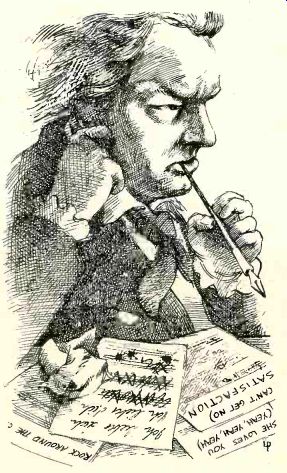
PULP MUSIC SOMEONE (Edmund Wilson, maybe?) once said that reading pulp fiction was the mark of a truly second-rate mind. If that's the case, I have to plead guilty; I'd much rather spend an evening with H. P. Lovecraft's inbred New Englanders or Raymond Chandler's corrupt Los Angelinos than five minutes with Erica Jong at the airport or John Updike in the groves of academe. This dissociation of sensibility (a tip of the Hatlo Hat to T. S. Eliot for that nifty turn of phrase) has, I'm afraid, been lifelong; I remember only too well the sorrowful look my eleventh-grade English teacher gave me when I ventured that Matthew Lew is' early-nineteenth-century porno-Gothic The Monk was a better novel than a lugubrious weeper like Jane Eyre.

The very best pulp fiction, of course, ultimately becomes Literature; pulp music is rarely so lucky. This should not be surprising, really; we all know that Bach gets far less attention in our public schools than Shakespeare, and that a college student is far more likely to be exposed to literary critics Lionel Trilling and John Ciardi than to music critics Ernest Newman and Sir Donald Tovey (that is, if he or she can even read by the time college rolls around, which is looking less and less likely if the decline in S.A.T. scores is any indication). "Serious" music is for all in tents a bastard child as far as the educational community in this country is concerned, and rock-and-roll is an embarrassment at best, al most beneath contempt. Nobody even bothers to make statements to the effect that listening to rock is the mark of a second-rate mind; you don't get your intellectual dander up over what is merely a youthful aberration on a level with goldfish swallowing.
Let me hasten to add that I'm not arguing for increased "legitimate" recognition for rock-far from it. The very last thing we need is another bit of excessive wretchedness such as Wilfrid Mellers' scholarly tome on the Beatles or any of those patently absurd and toadying college courses in "rock history." I simply think that it's significant that rock, like its equivalents in other genres-science fiction, the detective novel, comic books, even the good old Hollywood film-and unlike jazz, has maintained its astonishing popularity despite the various misguided cultural ob servers, critics, politicos, and academics who have attempted to put it under the micro scope. Its pulp status still remains, thank God, secure.
Viewing rock as pulp also helps us to under stand why the various "serious" musicians who have flirted with it (as well as those rockers who have gone high-brow) have generally fallen on their faces, just as Raymond Chandler stumbled in his dismal attempts at main stream fiction. Whichever side of the street you're coming from, it just never works, and we might as well face it: the music of Todd Rundgren, Rick Wakeman, ELP, and the rest of the synthesizer cut-ups is no more and no less gauche than Leonard Bernstein's Mass or William Russo's Concerto for Blues Band and Orchestra.
There is a story, probably apocryphal, that some years ago a group of twenty or so leading American composers took a look at the enormous sums of money the Beatles were raking in and decided that it was ridiculous for them to be eking out livings at universities and depending on foundation grants for their artistic survival. So they sat down with the entire Lennon and McCartney oeuvre, reduced it to a set of rules, and tried to compose their own rock tunes. It didn't work, of course, and they were eventually forced to throw in the towel, disgusted and mystified. To this day they probably don't understand why they failed, why you can no more "compose" good rock than you can sit down at a piano and sort of "jam" Bartok.
I have indulged in the preceding ramble be cause I want to make it quite clear that I am a firm believer in the sufficiency of rock; it needs no justifications whatsoever along the lines of "rock as poetry," "rock as art song," or "rock as theater." I am also considerably less than enamored of discussions of High versus Low Art, global villages, or any such gobbledygook. I do think, however, that rock, for what it's worth, is somehow becoming well, for lack of a better word, more mature.
For reasons that should be obvious by now, I am somewhat uneasy with that thought, and I certainly am not ready to concede, as one critic colleague has, that we are entering the age of-adult" music. But there's no question that a number of our better artists have gotten a bit reflective of late, perhaps as a reaction to the unfortunate times we live in, perhaps (more likely?) simply as a result of getting older. The Stones, as usual, anticipated this trend with "Exile on Main Street," and last year alone we saw such albums as Neil Young's "Tonight's the Night," Dylan's "Blood on the Tracks," Springsteen's "Born to Run," and "The Who by Numbers," all of which dealt with personal concerns in an unprecedentedly honest and powerful way.
WHICH brings us to Patti Smith, about whom I have been bending your ear for the last few months. She finally has her album out, and I'm afraid there's simply no way to deal with it except in terms of what I've just been talking about: if ever there was an adult record, this is it. It's a fiendishly difficult piece of work, and I suspect that as a result it's going to polarize people like crazy, which is too bad, because for all its overreaching, I can't remember a first album that exhibited such overwhelming potential.
What it boils down to is whether or not we are willing to admit that rock means anything more than "it's got a good beat and you can dance to it." Personally, I've never made up my mind (and I suspect that that very ambivalence is part of what gives rock its power).
Certainly, I'm distrustful of records that re quire two pages of arch intellectualizing for heir proper appreciation, and yet I simply can't abide the mindless android-like disco stuff that seems just now to be about the only alternative.
And so, either you'll be simply knocked out by what Patti is attempting with "Horses" he mating of "traditional" poetic diction (in her case the Symbolists and the Beats) with he diction of rock and creating an appropriate musical style to go with it-or you'll hear only a mannered, technically limited chick singer waxing obscure in front of a mono chromatic rock band, the whole sounding like an only slightly less pretentious version of the Velvet Underground. I am myself convinced up front, despite the album's limp production job, because there's real passion here--you can tell what a labor of love this was for Patti, on all levels. And I would suggest that the skeptical check her out in person before making up their minds.
-----------
Also see:
CHOOSING SIDES, IRVING KOLODIN